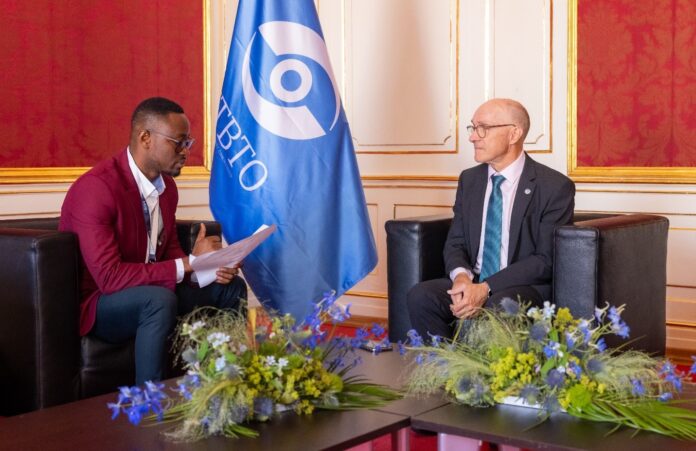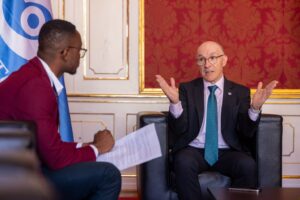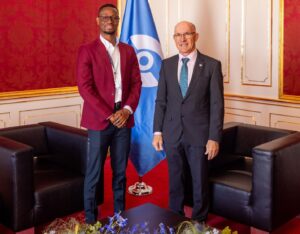
The Executive Secretary of the Comprehensive Nuclear-Test-Ban Treaty (CTBTO), Dr. Robert Floyd, says the active involvement and support of African nations is crucial for achieving the organisation’s goal of a nuclear-weapon-free world.
He described the continent as being the “heartbeat” of the Comprehensive Nuclear-Test-Ban Treaty (CTBT) in an interview with the B&FT’s Mohammed Awal at the Hofburg Palace, Vienna, during the 2023 Science and Technology (SnT) conference organised by the CTBTO.
The treaty has created a firm and virtually unchallenged global norm against nuclear testing; and since it opened for signature in 1996, tests have been conducted on only 10 occasions compared with more than 2,000 over the five previous decades.
In this century, only one country – North Korea – has breached the norm and tested nuclear weapons.
And with a near-universal support, signed by 186 countries to date and ratified by 177, Dr. Floyd said there are only three countries on the African continent that have not yet ratified the treaty.
Given the continent’s history with nuclear weapons tests during the era of colonialism, when between 1960 and 1966 the French colonial regime detonated 17 nuclear bombs in colonised Algerian Sahara and tested other nuclear technologies and weapons – spreading radioactive fallout across Africa and causing irreversible contamination, Dr. Floyd stressed that “a treaty to create a ban on nuclear testing is very much in the heart of Africa”.
“We have seen a number of them ratifying the Treaty in the last year or two, and two more are well on the way. And so, even by the end of this year, there might only be one country in all of the African continent that has not ratified the CTBT. A nuclear-free Africa and a test-free Africa is clearly in the heart of African nations; maybe that’s because there was nuclear testing that took place in the territory of some African states,” he stated.
The Interview
B&FT: Nuclear testing is a key step in the development of nuclear weapons. By ending this, the CTBT curbs all nuclear arms proliferation. Africa is key to stopping this…so, are there any initiatives or programmes that the CTBTO has undertaken to encourage African nations to sign and ratify the CTBT? How successful have those efforts been?
Dr. Robert Floyd: Almost all African countries are ratifying states of this treaty. So, a treaty to create a ban on nuclear testing is very much in the heart of Africa. At this point in time, there are only three countries on the African continent that have not ratified the CTBT.
We have seen a number of them ratifying the treaty in the last year or two, and two more are well on the way. And, so, even by the end of this year, there might only be one country in all of the African continent that has not ratified the CTBT.
A nuclear-free Africa and a test-free Africa are clearly in the heart of African nations; maybe that’s because there was nuclear testing that took place in the territory of some African states.

B&FT: The CTBT bans nuclear explosions by everyone, everywhere. It has near-universal support, signed by 186 countries to date and ratified by 177. However, 44 specific nuclear technology holder countries must sign and ratify before the CTBT can enter into force as international law. What strategies does the CTBTO employ to encourage ratification and how can these efforts be strengthened?
Dr. Robert Floyd: We have conversations ongoing with each state anywhere in the world, and this is not focused on Africa alone. We want to see universal support for this treaty. We work one-on-one with every state that’s not yet signed or ratified the treaty, to understand their circumstances and see what the pathway could be to move from where they are now to where they ultimately will want to be in full ratification of this treaty. We will continue to do that with the African states remaining yet to ratify.
B&FT: The CTBT has created a firm and virtually unchallenged global norm against nuclear testing. Tests have been conducted on only 10 occasions since it opened for signature in 1996, compared with more than 2,000 over the five previous decades. To sustain this capacity building and technology transfer is crucial. So, what’s the CTBTO doing to support capacity building and technology transfer in Africa, particularly in the context of nuclear test monitoring and verification?
Dr. Robert Floyd: One of the pleasures of this job is to work with developing countries around the world, to see greater capacity built in areas that are relevant to this treaty. And what that generally means is establishing in each country a national data centre (NDC), where they can receive all of the verification data from the three hundred and thirty-seven facilities all around the world; this would be beamed in by satellites to each country and to their national data centres.
But, importantly, training the people of those countries on how to access the data, analyse the data to use it in concluding whether anybody has conducted a nuclear explosive test or to use it for other civil and scientific purposes – including natural disaster warning systems and management, whether it’s earthquakes, volcanoes, hurricanes, tsunamis or other scientific research – it’s really wonderful to see this capability being put in the hands of states, no matter how large or small, all across the continent of Africa.
B&FT: So, what role can African nations play in strengthening the CTBTO’s global monitoring and verification capabilities, and how can they actively contribute to the organisation’s mission?
Dr. Robert Floyd: On the African continent, there are more than thirty-five of our International Monitoring System (IMS) stations. Their locations are determined by our Treaty. But more than 35 of the 337 are in Africa, hosted by African countries.
And we love working with the African countries to make sure those stations continue to operate really well to transmit data faithfully and consistently and contribute to our global awareness of any evidence of nuclear explosions. So, African countries are contributing very significantly to our global coverage through the international monitoring system stations that are located on the continent of Africa.

B&FT: Lastly, how does the CTBTO influence public support of the Treaty in the region? The citizenry needs to support what their countries are doing, they need to back their countries’ participation to ensure a nuclear-weapon-free world. So, what’s the CTBTO doing exactly to ensure there’s massive public support?
Dr. Robert Floyd: We are very keen to see every state signatory actively involved in the CTBTO, and that then includes every African state. And I am very delighted with the support that we get from the continent already. But your point that public awareness is important and empowers your political leadership is also critically important because this Treaty – the Comprehensive Nuclear-Test-Ban Treaty – is going to have to last forever. Even in a world where nuclear weapons have been dismantled and states have disarmed, we will still need the monitoring system that we have with this Treaty to make sure nobody is cheating… nobody is developing nuclear weapons. So, the next generation needs to be aware of the importance of this, so that their governments and the governments to come to continue to support the Comprehensive Nuclear-Test-Ban Treaty. So, the next generation is critically important now, and it’ll forever be so.
B&FT: Thank you.









